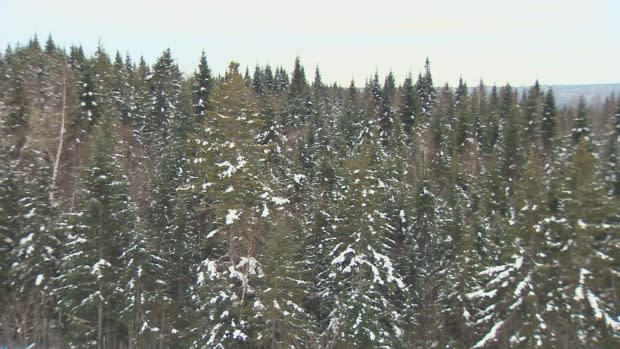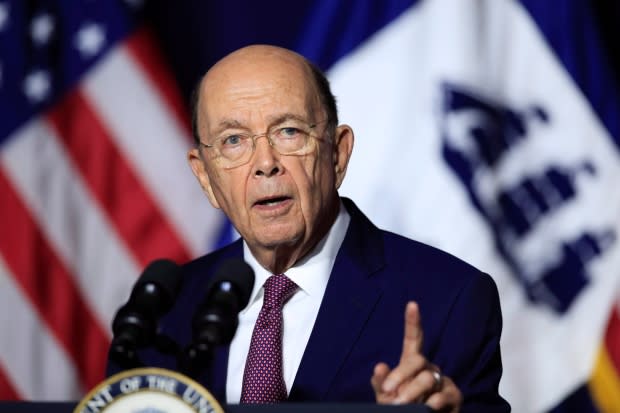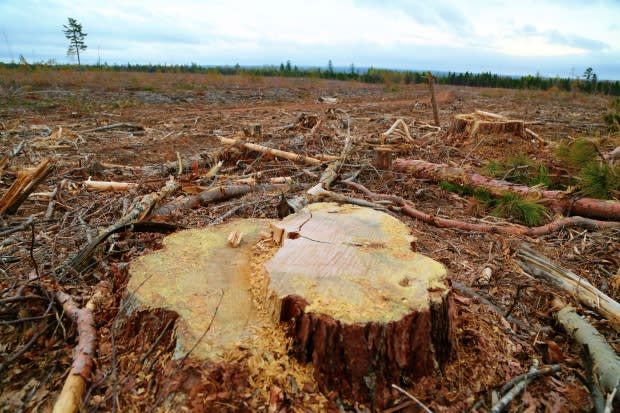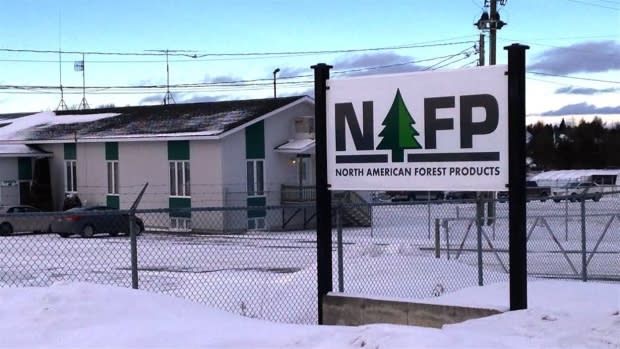U.S. investigating whether N.B.'s cheap property taxes on forests break trade rules
The U.S. Commerce Department in Washington is set to rule in June whether cheap property taxes charged by New Brunswick on privately owned forests in the province are a subsidy.
It's a decision that could mean trouble for more than 40,000 New Brunswick landowners and force a hard look by Fredericton lawmakers at the way the majority of private property in the province is assessed and taxed.
So far the New Brunswick government is not commenting on what will happen if the ruling goes poorly.
"Our government is confident that our property tax policies do not constitute a countervailable subsidy," said Robert Duguay, a spokesperson for the province's Intergovernmental Affairs division, in a statement to CBC News late Sunday.
"We continue to fight this unfair US trade action."
In a hearing inside the Herbert Hoover Building in Washington last month, lawyers for a collection of U.S. lumber companies argued New Brunswick's practice of assessing and taxing forest properties as though they are worth $100 per hectare is artificially low and a clear government benefit to private owners of timberland.
Forest properties on the open market in New Brunswick generally sell for prices much higher than that.
"The New Brunswick Assessment Act states that all real property shall be assessed at its real and true value but freehold timberland shall be assessed at 100 Canadian dollars per hectare," said Sophia Lin, one of the lawyers representing the U.S. lumber companies at the March 25 hearing.
"This shows special treatment of timberland properties, as opposed to other types of properties, which are assessed based on its real and true value."

The $100 valuation was set in 1994 by the former government of Frank McKenna and has been left frozen in legislation by a succession of New Brunswick governments for the last 26 years.
It applies to an estimated 2.8 million hectares of privately owned forest in the province — an area five times the size of Prince Edward Island — and represents more than 70 per cent of all private property in the province
More than one third of that land is owned two forestry companies: J.D. Irving ltd (728,000 hectares) and Acadian Timber Corp. (308,000 hectares). The rest is owned by 40,000 other companies and individuals in both large and small blocks.
Forests are among the only properties in New Brunswick that provincial assessors are not allowed to value at market prices. Instead they are deemed to be worth $100 per hectare and taxed at that amount no matter what they sell for.

In one major transaction in December, Fornebu Lumber Company sold 15,750 hectares of New Brunswick lands it owned to European buyers. The sale was for an average price of $780 per hectare ($12.3 million). Most of what sold was privately owned forest assessed by the province at the $100 rate.
Lin said tax bills on private forestland because of the $100-per-hectare assessment are therefore artificially low as well and "provides a financial contribution in the form of government revenue foregone" to forest companies who either own their own private forests or ultimately buy and use wood from those who do.
Saint-Quentin company in U.S. crosshairs
The case being considered in Washington is narrowly focused on one company — North American Forest Products (NAFP), which operates a sawmill in Saint-Quentin.
It exports products into the United States and American producers contend the wood it uses — whether from its own timberland in northwestern New Brunswick or purchased from other private timberland owners — unduly benefits from cheap property taxes.
But it has been the province itself under the harshest spotlight — forced to dispatch bureaucrats to the U.S. capital to explain New Brunswick's property tax system to trade investigators and hire its own Washington law firm to try and stop a subsidy ruling.
A preliminary finding by the Department of Commerce in February went against the province and the hearing in March allowed all sides to fully state their positions in advance of a final ruling expected in late June.

Lawyers for New Brunswick and NAFP have made a number of procedural objections about the case proceeding as well as arguments opposing the idea the low tax rate is a subsidy to industry.
They acknowledge the assessment of forest properties bears little resemblance to what the properties actually sell for and so have been advancing a claim the $100-per-hectare valuation is reasonable because it applies only to the forest floor — not to the trees themselves.
It's similar to how agricultural crops do not count in farmland assessments.
"The Department must evaluate whether a benefit exists, against the market value of only the underlying land on timberland in New Brunswick, excluding the value of standing timber on that land," said Aaron Hutman, one of two Washington lawyers representing New Brunswick at the March hearing.
Benefiting the little guy
That argument would appear to be a stretch given there is no record of New Brunswick legislators proposing timber to be treated like "crops" and setting a $100-per-hectare rate 26 years ago on the forest floor would have made little sense since treeless forest lots are not even worth that much now.

Hutman said evidence put forward by NAFP showed forest floor in New Brunswick, without trees, has a value somewhere between nothing and $85 per hectare.
"This argument is without merit," said Lin in her response.
New Brunswick's lawyers also argued forest ownership is quite common in New Brunswick among regular citizens and because all benefit from the same tax treatment it proves the tax benefit is universal and not one directed toward industry.
"So, for example, a family who owns forested land contiguous with their primary residence or just having some large backyard would be able to receive the same assessment value," said Hutman.
"Let me emphasize that, while owning 10 hectares of land is a little bit unusual — certainly in Washington, D.C. — it's not unusual in New Brunswick."

